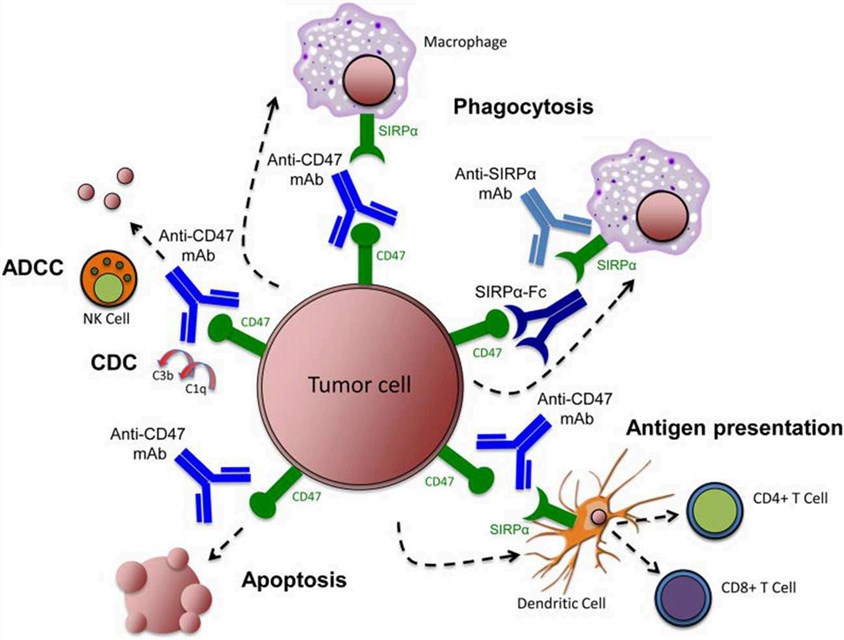CD47, also known as integrin-associated protein, is a molecule that belongs to the immunoglobulin (Ig) superfamily. It is ubiquitously expressed in normal cells, acting as a marker of self, to help with autologous recognition and avoid inappropriate phagocytosis. CD47 binds to the signal-regulatory protein alpha (SIRPα), an inhibitory immune receptor expressed in myeloid cells. In the process of carcinogenesis, overexpression of CD47 has been identified across various types of human tumors. CD47 is considered as a biomarker of cancers, and its high expression is an adverse clinical prognostic factor. Engagement of CD47 triggers SIRPα signaling, which prevents cell activation and delivers a "don't eat me" signal resulting in the inhibition of phagocytosis of tumor cells to escape from this immunosurveillance easily.
The CD47-SIRPα axis is a key regulator of cell fate in a number of conditions and hence an attractive therapeutic target. Accumulating evidence indicates that the SIRPα-CD47 immune checkpoint blockade is a promising new way to treat human cancer. Studies have shown that blocking interactions between CD47/SIRPα can promote the eradication of tumor cells by phagocytes, including macrophages and neutrophils. In addition, targeting the CD47/SIRPα may also promote the function of antigen-presenting cells to stimulate anti-tumor immune response mediating by adaptive T cells.
 Fig.1. Targeting the CD47-SIRPα pathway in cancer.1,2
Fig.1. Targeting the CD47-SIRPα pathway in cancer.1,2
Like other immune checkpoint molecules, there are also two targets to choose from when disrupting the CD47/SIRPα axis. Different inhibitors targeting CD47/SIRPα alone or combined with other therapeutics or checkpoint inhibitors have been generated to investigate their therapeutic effects on various cancer types. According to their design concepts, these agents include anti-CD47 antibody, anti-SIRPα antibody, and SIRPα-Fc fusion protein. Combination with the other established therapies (surgery, radiotherapy, chemotherapy, targeted therapy, and anti-PD-L1/PD-1 checkpoint inhibitors) could also be promising to augment prophagocytic signaling in the hope of substantially enhancing overall antitumor responses. In conclusion, antagonism of the CD47/SIRPα axis is a promising and rapidly emerging anticancer strategy that tries to leverage the ability to counteract or block the antiphagocytic signal delivered by CD47 through SIRPα.
Combining state-of-the-art technology with personal service and attention, Creative Biolabs offers a series of custom services for immune checkpoints, including but not limited to:
Please do not hesitate to contact us for more detailed information.
References
All listed customized services & products are for research use only, not intended for pharmaceutical, diagnostic, therapeutic, or any in vivo human use.
USA
Tel:
Fax:
Email:
Copyright © 2026 Creative Biolabs. All Rights Reserved.